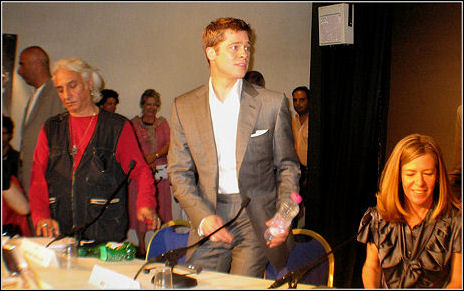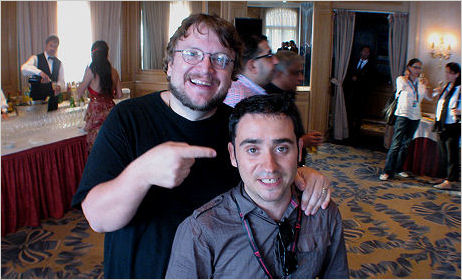Famed director Roman Polanski (Chinatown, The Pianist) caused a stir a day and a half or two days ago at the press conference for Chacun son Cinema, the anthology film comprised of 35 shorts by 35 distinguished directors.
The questions were on the banal side (which is not an altogether uncommon thing during this festival), and Polanski, irked by some especially lame inquiry, lost his temper and lashed out at either the questioner or, according to one version I heard, all the journalists in the room, calling them “losers” and whatnot. He then allegedly urged his fellow directors to leave the dais in a show of solidarity, which they declined to do.
Cut to this morning at the Grand Palais. Just prior to the showing of The Diving Bell and the Butterfly, Polanski’s short, “Cinema Erotique,” was shown, and a pair of journalists to my right and left — older guys — booed when his name came on the screen. I’m on Mr. Polanski’s side in this squabble. I’ve listened to hundreds upon hundreds of deadbeat questions at round tables and press conferences; I’m surprised that dierctors and celebrities don’t lash out more.
Diving Bell and Butterfly
Julian Schnabel‘s The Diving Bell and the Butterfly, which screened for press at the 8:30 this morning, is a passable attempt to render a beautiful, inwardly-directed portrait about what is truly essential and replenishing in life. But the film is neither of these things, and is nowhere close in terms of poetic resonance and emotional impact to Schnabel’s Before Night Falls (’00). It’s sensitively realized and skillfully made, but it’s a movie about a state of nearly 100% confinement that itself too often feels confining.
Alfred Hitchcock attempted a similar-type experiment when he made Lifeboat, which takes place entirely aboard a lifeboat floating on the Atlantic, and yet he kept audiences involved all through it. Schnabel makes his tale as visually intriguing and ingenious as anyone could have, but he’s locked himself into tight a spot, I fear.
Variety columnist Anne Thompson recently wrote that The Diving Bell and the Butterfly is “one of the hottest projects up for sale in Cannes” and that “a lot of distributors are chasing this one.” I don’t think this is the case any longer. The French-language Butterfly is opening in France right after the festival ends, but if I were an American buyer I would steer clear.
An adaptation of the late Jean-Dominique Bauby‘s memoir of the same name, it’s about how the self-satisfied, sophisticated Bauby (Mathieu Amalric) — an Elle editor with a wife three kids and a mistress — is left totally paralyzed after a massive stroke.
Bauby’s condition is called “locked-in syndrome,” which has left him unable to express himself except by blinking his left eye. A much more confining thing, in other words, than poor Chris Reeve‘s condition after breaking his neck
The book was written with the help of a transcriber who recited a frequency- ordered alphabet, waiting until Bauby blinked to indicate the correct letter. Each word reportedly took approximately two minutes to convey, and the book itself took about two hundred thousand blinks to write.
Like the book, Schnabel’s film chronicles Bauby’s sense of day-by-day, minute-by-minute imprisonment and how this condition paradoxically frees him from his previous obsessions and attentions. Schnabel clearly feels that Bauby become a richer, more spiritually fulfilled man after his misfortune, but he didn’t convince me of this. He seems to be saying that we all, in a sense, suffer from locked-in syndrome, and that we need to free our souls and imaginations and so on. That’s definitely a thought worth pondering, but I’d given this matter a lot of thought before sitting down this morning with Butterfly.
Bauby’s book was published on 3.6.97. It was well reviewed and sold 150,000 copies in the first week. But two days after the French version of the book was published, Bauby passed. I don’t think that was such a bad thing, frankly. I’m all for living and fighting until the last, but winking your way through an extremely restricted version of living tests the limits of this positivist philosophy.
Tarantino thoughts
The Death Proof press conference is going to happen at 12:30 pm — 45 minutes from now — and I’m thinking of blowing it off. What’s Quentin Tarantino going to say? “Sorry, but self-referential masturbatory cinema is what I do, and who I am. Every guilty, lowdown cinema-watching impulse that you, the audience, harbor within yourselves, I epitomize and celebrate and in fact have made a wild, rollicking career out of.
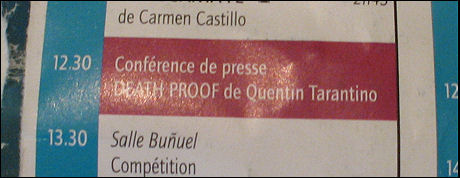
The press guide listing for Quentin Tarantino’s Death Proof press conference…
“My movies are about nothing from my own personal, deep-down self because I have no personal, deep-down self except for a love of ’70s and ’80s exploitation fringe cinema, exploitation-level actors and adrenalized Hong Kong action aesthetics, which makes me happy but obviously eludes people who aren’t on my elitist, beyond-hip wavelength. But I’m Mr. King Shit so what do I care?
“I am not about absorbing and translating and reconstituting real-life experience, but resuscitating stylistic imitations of life made by genre filmmakers of two and three decades ago. But hey, nobody does stylistic wank-offs better than me. No one has revived more moribund acting careers, and nobody writes trash- talk dialogue with quite the same zing. And I’m pretty damn good at shooting car chases.” (Which is true.)

…and the press conference listing in today’s daily bulletin. Notice the festival’s willingness to go along with Tarantino’s little joke and announce that director Andrei Zviaguintsev will be in attendance, and not himself.
Bart, Moore, Durling
Another Michael Moore q & a, this one with Variety editor Peter Bart at the American Pavillion.
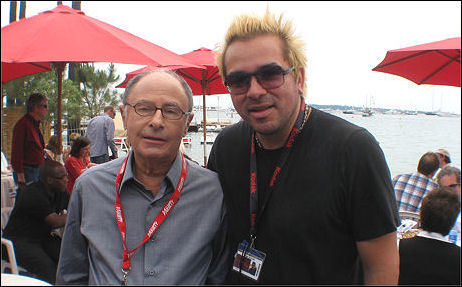
Peter Bart, Roger Durling prior to today’s Michael Moore discussion (moderated by Bart) about Sicko — Monday, 5.21.06, 2:25 pm
“Mighty Heart” conference
Here’s a portion of today’s A Mighty Heart press conference, which included producer Brad Pitt, director Michael Winterbottom, costars Angelina Jolie, Dan Futterman, Archie Panjabi and Irfan Khan (who’s the standout supporting actor in this film).
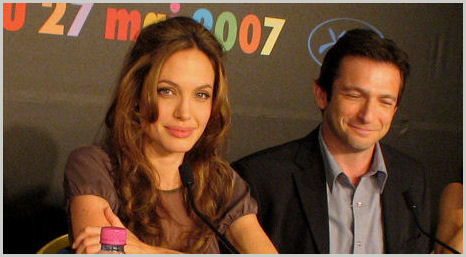
A Mighty Heart star Angelina Jolie and costar Dan Futterman (i.e., Oscar-nominated screenwriter of Capote) at this afternoon’s press conference — Monday, 5.21.07, 1:05 pm
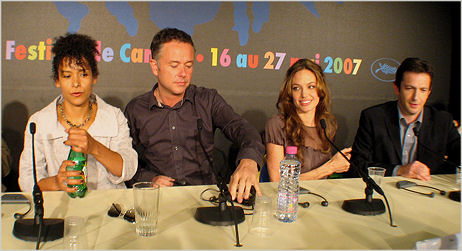
“Mighty Heart” reactions, conference
The agreeably shocking thing about Michael Winterbottom‘s A Mighty Heart, which had its first-time-anywhere press screening this morning inside the Grand Palais, is that it’s not a Michael Winterbottom film. Not, I mean to say, a film that has seemingly emerged from the palette and the sensibility of the director of The Road to Guantan- amo, Tristram Shandy: A Cock and Bull Story, 9 Songs, Code 46 and 24 Hour Party People…all but one of which I had problems with to varying degrees.
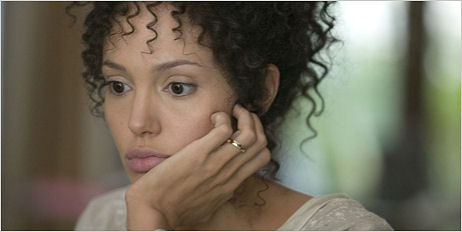
Instead, A Mighty Heart is a Michael Mann film — a tight, absorbing, sharply assembled investigative procedural. It summons memories of the pacing, the underplayed performances and the sense of swiss-watch exactitude that have come to be associated with Mann’s films. I can’t recall another film in which a name-brand director has so totally abandoned a signature style (wait…does Winterbottom have one?) and just become, in a sense, “someone else.”
A Mighty Heart is about the kidnapping and murder ofWall Street Journal reporter Daniel Pearl (Dan Futterman), as experienced by his distraught widow Mariane Pearl (Angelina Jolie). It’s handsomely shot (especially surprising given the generally meh photography in Winterbottom’s previous films), intricate and yet surprisingly easy to keep track of, and very deftly edited.
And in it, Jolie has given a completely satisfying and quite admirable performance which feels to me like the best thing she’s ever done. More mature and less showy than her nutter turn in Girl Interrupted (for which she won a Best Supporting Actress Oscar. The role of Mariane Pearl isn’t exactly a showboat thing (although there’s a very strong grief-venting scene in the third act that everyone will remember). It’s not about histrionics as much as just getting it right and staying with the truth of it — but Jolie’s carefully measured emoting plus her aural and physical resemblances to the Real McCoy make this performance a fairly safe bet for a Best Actress Oscar campaign later this year.
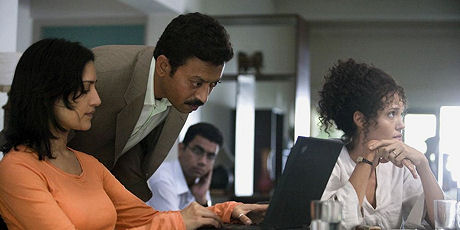
There’s a lot more to discuss here, but I have to get to the longer version of Quentin Tarantino‘s Death Proof, which starts in less than 40 minutes. I’ll try and complete this later tonight, or certainly by tomorrow morning.
Ethan Coen on waste and annihilation
HE to Ethan Coen (at today’s press luncheon): “The only speed bump for mainstream audiences in No Country for Old Men, as you know, is your decision to not allow audiences to share in Josh Brolin‘s final fate, as it were.”
Coen to HE: “And that’s a perverse decision, isn’t it?”
HE: “Well, that’s one of the things that give the film artistic authority and distinction, and it either makes people respect it or…”
Cohen: “Or dislike it.”

No Country for Old Men co-director and co-writer Ethan Coen at today’s Miramax press luncehon — Sunday, 5.20.07, 1:55 pm
HE: “Well, we all know that there’s a certain expectation [out there], that when you’ve spent the entire movie with a guy, you wanna…but for me, this is what makes the film extra-special.”
Coen: “And for us too. I mean, it’s just from the novel and [garbled]. But when you get to this point you say, ‘Okay, the movie’s not ultimately about this guy…so what is it about?'”
HE: “About the end of the world, about the good old stuff really coming to an end, about being engulfed by waste and annihilation.”
Coen: “Uh-huh!”
Here’s a sound file of the conversation.
Nolyce on Beilinski Duel
A fast follow-up on the Duelling Bielinski Brothers projects (i.e., Phillip Noyce‘s vs. Ed Zwick‘s). I’ve recevied the following statement from Noyce, to wit: “Historical facts should not be owned or bartered, but it would appear that the life rights of surviving family and Bielski brigade members that our lawyers have maintained for the past several years could mean the following:
“Any other film about the Bielski Brothers” — Zwick’s — “might have to tell the story without retelling any of the incidents described in the personal statements of these real-life characters made exclusively to our research team or contained exclusively in the source material to which we hold the rights.
“Nonetheless, a fiction film inspired by the Bielski Brothers will still leave plenty of room for the remarkable real story to be told.The bravery of the Bielskis should be celebrated over and over. — Phillip Noyce.”
Javier Bardem Josh Brolin
It was hard to hear for all the restaurant clatter, but four No Country For Old Men guys — director-writers Joel and Ethan Coen, and costars Javier Bardem and Josh Brolin — sat down at a press luncheon early this afternoon at the Noga Beach eatery. The mp3s — here’s Bardem’s and here’s Brolin’s — are discernible if you wear earphones and/or turn the sound up.
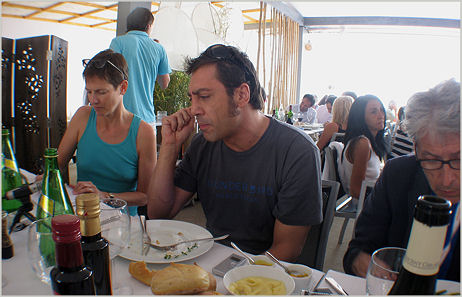
No Country for Old Men costar Javier Bardem at this afternoon’s Miramax press luncheon at the Noga Beach– Sunday, 5.230.07, 2:20 pm
Cannes montage #4

Weinstein Co. chief Harvey Weinstein, Variety critic and director of Pierre Rissient Todd McCarthy at yesterday afternoon’s Variety party at the Hotel Majestic — Saturday, 5.19.07, 6:35 pm
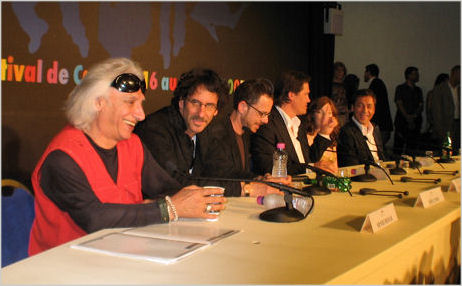
At yesterday afternoon’s press conference for No Country For Old Men — (l. to r.) moderator Henri Behar, Joel Coen, Ethan Coen, Josh Brolin, Kelly McDonald, Javeir Bardem — Saturday, 5.19.07, 2:35 pm
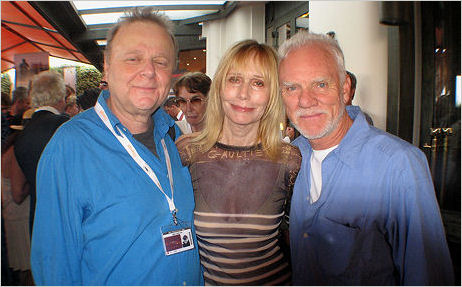
Never Apologize director Mike Kaplan, Sally Kellerman, Malcolm McDowell at Variety/Majestic party — Saturday, 5.19.07, 7:15 pm
Guillermo Bayona
“Sicko” review
Variety‘s Sicko review, written by Alissa Simon. She’s calling it “an entertaining and affecting dissection of the American health care industry that documents how it benefits the few at the expense of the many. Pic’s tone alternates between comedy and outrage, as it compares the U.S system of care to other countries. Given Moore’s celebrity and fan base, plus heightened awareness of pic resulting from the heated battle between left and right already ongoing in cyberspace, returns look to be extremely healthy.”


